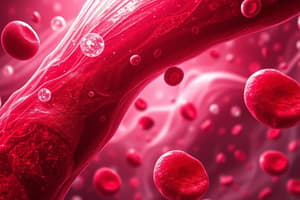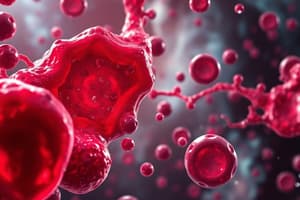Podcast
Questions and Answers
What percentage of leucocytes do eosinophils represent?
What percentage of leucocytes do eosinophils represent?
- 50-70%
- 0.5-1%
- 20-40%
- 2-4% (correct)
Which type of cells are directly responsible for the production and carriage of histamine and heparin?
Which type of cells are directly responsible for the production and carriage of histamine and heparin?
- Neutrophils
- Basophils (correct)
- Monocytes
- Eosinophils
Which of the following functions is associated with lymphocytes?
Which of the following functions is associated with lymphocytes?
- Change into macrophages to engulf bacteria
- Most abundant among leucocytes
- Formation of antibodies (correct)
- Absorb histamine in allergic reactions
What is the predominant type of granulocyte that is highly phagocytic and represents the largest percentage of leucocytes?
What is the predominant type of granulocyte that is highly phagocytic and represents the largest percentage of leucocytes?
What type of cells are monocytes classified as?
What type of cells are monocytes classified as?
What is the primary function of red blood corpuscles (RBCs)?
What is the primary function of red blood corpuscles (RBCs)?
Which component makes up the majority of blood volume?
Which component makes up the majority of blood volume?
How long do red blood corpuscles (RBCs) typically live?
How long do red blood corpuscles (RBCs) typically live?
Which type of white blood cell is most abundant and is primarily involved in defense against infections?
Which type of white blood cell is most abundant and is primarily involved in defense against infections?
What percent of blood plasma is approximately made up of water?
What percent of blood plasma is approximately made up of water?
What is the normal range of white blood corpuscles (WBCs) per cubic millimeter in healthy individuals?
What is the normal range of white blood corpuscles (WBCs) per cubic millimeter in healthy individuals?
Which of the following is NOT a component of blood plasma?
Which of the following is NOT a component of blood plasma?
Where are red blood corpuscles (RBCs) primarily produced?
Where are red blood corpuscles (RBCs) primarily produced?
Flashcards
Granulocytes
Granulocytes
White blood cells characterized by the presence of granules in their cytoplasm.
Neutrophils (microphages)
Neutrophils (microphages)
The most abundant type of granulocyte, playing a crucial role in fighting infections through phagocytosis.
Eosinophils
Eosinophils
A type of granulocyte involved in allergic reactions and parasitic infections.
Basophils
Basophils
Signup and view all the flashcards
Non-granulocytes
Non-granulocytes
Signup and view all the flashcards
Blood
Blood
Signup and view all the flashcards
RBCs (Red Blood Cells)
RBCs (Red Blood Cells)
Signup and view all the flashcards
WBCs (White Blood Cells)
WBCs (White Blood Cells)
Signup and view all the flashcards
Platelets
Platelets
Signup and view all the flashcards
Plasma
Plasma
Signup and view all the flashcards
RBC Formation
RBC Formation
Signup and view all the flashcards
Study Notes
Blood Composition
- Blood is a fluid tissue, suspended in watery plasma, constantly circulating through blood vessels by heart action.
- Blood comprises 45% cells and 55% plasma.
Blood Cells
- Red Blood Cells (RBCs) / Erythrocytes:
- 45% of blood volume
- Biconcave discs, non-nucleated.
- 5.4 million/mm³
- Carry oxygen (O2) and carbon dioxide (CO2).
- Produced in bone marrow.
- Live ~120 days, then destroyed in the liver and spleen.
- White Blood Cells (WBCs) / Leukocytes:
- ~4000-11000/mm³
- Various types with different functions.
- Crucial for defense against bacteria.
- Formed in bone marrow.
- Platelets / Thrombocytes:
- ½ - ½ million/mm³
- Involved in blood clotting.
- Formed in bone marrow.
Blood Plasma
- 55% of blood volume
- Straw-colored liquid
- Composition:
- Water (92%)
- Proteins (6-8%): Albumin, globulins, fibrinogen
- Organic substances (2%): e.g., urea, glucose, hormones, enzymes
- Inorganic substances (1%): e.g., cations (Ca, Mg, Na, K), anions (Cl, HCO3)
Blood Cell Types (Elaboration)
- Granulocytes:
- Neutrophils (most abundant, 50-70%): highly phagocytic, important for fighting infection.
- Eosinophils (2-4%): involved in allergic reactions and parasitic infections.
- Basophils (0.5-1%): involved in allergic reactions, release histamine and heparin.
- Non-Granulocytes:
- Lymphocytes (20-40%): vital for immunity, antibody production.
- B-cells: Produce antibodies
- T-cells: Cell-mediated immunity
- NK cells: Kill infected cells
- Monocytes (3-8%): migrate into tissues, turn into macrophages that engulf bacteria.
- Lymphocytes (20-40%): vital for immunity, antibody production.
Additional Notes
- Normal red blood cell count: 5.4 million/mm³ (males), 4.8 million/mm³ (females).
- Bone marrow is the site of blood cell production (RBCs, WBCs, platelets)
Studying That Suits You
Use AI to generate personalized quizzes and flashcards to suit your learning preferences.




